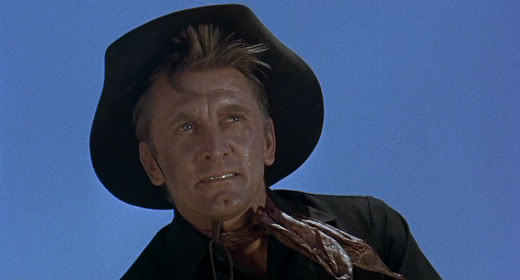
The Last Sunset (1961) is a film that seems to have all the credentials, all the ingredients that go towards making a top flight production: a highly talented director, a fine cast, and a script by a top writer. In spite of all this the final result is a movie that doesn’t quite gel and one that delivers a lot less than it initially promises. As is usually the case when a film proves disappointing, the fault lies with the script. There are some interesting elements which are introduced and then disposed of before they’ve had a chance to play out fully. Generally, this leads to both clutter and a lack of focus. In the end, we’re left with a film that’s not exactly bad but one that could and should have been a whole lot better.
The opening credits play over a dogged pursuit across a southwestern landscape, down into Mexico where the bulk of the action will unfold. O’Malley (Kirk Douglas) is the black clad fugitive, a killer who carries a derringer instead of a six-shooter. Hot on his trail is Dana Stribling (Rock Hudson), a lawman with a personal interest in seeing his quarry brought back to Texas to hang. O’Malley is heading for a ranch run by a faded Virginia gentleman with a fondness for the bottle. The rancher, Breckenridge (Joseph Cotten), happens to be married to O’Malley’s old sweetheart Belle (Dorothy Malone) and it’s soon evident that he’s continued carrying a torch for her for years. The two men strike a deal whereby O’Malley will help Breckenridge drive his herd up to Texas, but he also claims he’s going to take his new partner’s wife off him. That in itself could have provided an interesting scenario, but the script has no intention of remaining so simple. Stribling’s arrival leads to an uneasy truce with hunter and hunted agreeing to pool their talents in order to ensure the success of the cattle drive before settling their own scores. With both newcomers being clearly interested in the charms of Belle the scene looks set for a juicy three-way contest for her affections. However, that’s not to be for Breckenridge soon departs the scene after being gunned down in a cheap cantina. What’s even more frustrating is the fact that moments before his death the audience is treated to revelations about Breckenridge’s shameful past. So, two potentially rich plot veins are left unmined. Instead we’re treated to the seemingly interminable drive to Texas with too much talk and too few sparks. It seems that the producers were aware that they were in danger of bogging the plot down, so three shifty and unscrupulous cowboys, who plan to get in on the white slavery racket, are introduced (Jack Elam, Neville Brand and James Westmoreland) to try to spice up proceedings. Again the opportunity is lost as these characters are killed off before they have the chance to make an impression. The script still has one hole card in reserve though, and it’s a real stinger. Nevertheless, in keeping with the rest of the picture, this gets handled poorly too. The problem is not with the nature of this final reveal, it’s suitably shocking, but the fact that we learn about it too soon. I won’t go into details here lest I spoil things for anybody, but the timing really draws all the tension and drama out of the climactic duel and leaves us with a flat and predictable ending.

With a combination of Robert Aldrich directing and Dalton Trumbo writing, I don’t think it’s unfair to have high expectations. For whatever reason, neither man was at the top of his game on The Last Sunset. Trumbo’s script meanders all over the place and flatters to deceive, with too many plot turns and too many undeveloped ideas. Aldrich allowed the momentum to flag after the first half hour or so and he never really recovered it after that. There are some nice shots, a well filmed sequence during a dust storm, and an attempt to claw back some tension in the climax through quick cutting but none of it adds up to enough to save the film. On top of all this the performances of the two leads are nothing to write home about either. Douglas seemed to be trying for the kind of deadly rascal that Burt Lancaster pulled off in Aldrich’s Vera Cruz but it doesn’t really work for him. Hudson just didn’t convince at all as the driven lawman and he comes across as merely bland. Dorothy Malone and Joseph Cotten were altogether more successful as the Breckenridges; the former exuding a worldly sexuality that made the attention of her various suiters highly credible, while the latter provided a fine portrait of a broken and guilty man. Maybe if Hudson’s character had been the one to snuff it in the cantina we would have got a more compelling film. It’s also a shame that Jack Elam and Neville Brand had to disappear so soon since such character actors were capable of raising the quality of any production.
The Last Sunset was given a release a few years back by Universal in R1 in the Rock Hudson – Screen Legend set. The transfer is a fine anamorphic one and, apart from the odd speckle, there’s not much wrong with it. Colour and sharpness are both strong with good detail. There’s a trailer for the film provided but that’s it as far as extras go. This movie couldn’t be classed as anyone’s finest hour but it’s not a complete dud. There are a handful of worthy performances and the adult theme that becomes apparent as it draws to a close mean that it deserves a look. Let’s just say that it wouldn’t be an ideal introduction to the work of any of the principals
Pingback: Ten of the Best – Women of the West | Riding the High Country